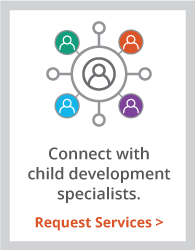Parenting isn’t easy. In fact, some say it’s the hardest job in the world.
There are dozens, probably hundreds, of books and guides for parenting support. It’s challenging to know which one is right for your situation.
One thing is certain. You know your child better than anyone else, and you can sense when something’s not right.
In this story, you’ll hear about how personalized parenting support can help your family get the help you’ve been craving. We’re sharing Shontee’s story, the parent of a young boy, Micah. Early on, Shontee had a gut feeling that Micah had unique challenges.
She was determined to get to the bottom of it.
You’ll also learn about Help Me Grow South Carolina and the role we played in supporting this family.
But let’s start at the beginning of the story.
Meet Shontee and Micah.
Shontee is originally from Brooklyn, New York, but has lived in South Carolina for many years. She’s the mother of three children. Two of her children are grown and moved out. She lives in Jonesville with her youngest son, Micah.
Shontee described Micah as a healthy baby at birth who went into daycare at about eight weeks old.
During Micah’s early days, he seemed to hit his developmental milestones. Shontee proudly describes Micah as “a very smart baby.”
But Shontee also explains Micah was different from her other two children.
Throughout this story, you’re going to learn about some of those differences.
And you’ll hear about a parent who refused to give up on her son. It’s Shontee’s perseverance that drives her story. Let’s start with the differences Shontee noticed early on in Micah.

Shontee describes her early concerns with Micah.
At about ten months, Shontee started to notice a difference in Micah. At times, he was inconsolable.
Shontee also came up against obstacles when Micah was in daycare.
The teacher said Micah would stand in his crib crying and screaming for “no reason.” He would throw tantrums when he didn’t get something he wanted or didn’t get his way.
Shontee began to think something was wrong. But she wasn’t sure what.
She wondered, “Maybe there’s something I’m missing.”
She decided to take her concerns about Micah to his pediatrician to gain some parenting support in this situation.
Shontee’s experience with Micah’s healthcare providers.
During a visit to the pediatrician at around one year old, Shontee explained what was happening with Micah. She described the crying and tantrums. She also explained Micah’s behavior at daycare.
But the doctor dismissed Shontee’s concerns and said this was normal behavior for a boy. When Shontee asked for her son to be tested, she was told he was too young.
But she knew in her heart the behaviors she saw in Micah were, as she described, “not normal.”
Remember, Shontee raised two other children and didn’t have the same experiences when they were young. They were her benchmark.
Shontee refused to accept the pediatrician’s response. She decided to go to another doctor for a second opinion and a better chance at parenting support.
Again, her concerns were brushed off.
They told her not to worry.
But how could she not worry? Shontee knew her son better than anyone else.
Shontee said, “I just wanted somebody to tell me what I could do to help my son.”
While she wasn’t receiving the parenting support she expected from doctors, she soon began facing challenges with Micah’s daycare.
Shontee and Micah’s challenges at daycare.
At the same time, daycare was challenging for Micah
But Shontee thought by talking to Micah’s teachers and telling them about his crying and tantrums, they would be better prepared to help him. One teacher said she could handle Micah because it’s “all about structure.”
After a couple of weeks, the daycare started calling Shontee, asking her to pick up Micah.
“You need to come pick him up.”
There was one specific incident that stood out in her mind.
Micah was playing with paper towels in the bathroom. When an adult staff member, not his teacher, found him, she confronted Micah. She escalated the situation by calling an administrator. At this point, three adult women were in the bathroom with Micah, all trying to manage the situation.
They told Micah he was in trouble. Looking back, Shontee understands this was a trigger for Micah. At the time, no one knew about his triggers.
Micah kept repeating to these adults he was scared. So he hid behind the toilet.
Finally, Micah got up and ran away. In all the commotion, he ran into one of the adults. What happened next?
Micah was expelled.
Shontee was forced to take Micah to another school. Again, Shontee was proactive and told his teacher about his tantrums, crying, and big behaviors. The teacher assured Shontee they would be able to handle Micah.
But soon, the phone calls asking Shontee to come pick Micah up started again.
Shontee desperately wanted to make this early learning center work for Micah. She wanted this center to give Micah the support he needed and the parenting support she yearned for.
So, she asked if she could sit in the classroom and observe what was happening. They said no.
She asked if someone could video Micah’s behavior in the classroom. They said no.
Shontee asked if she could sit outside the classroom to observe what was happening inside the classroom. They said no.
Shontee tried everything she could to help her son. She did all the right things.
And she didn’t give up.
Shontee knew in her heart parenting support was available, but she didn’t know where to find it.
The catalyst for change.
Shontee continued to look for a professional who would listen. Someone who would acknowledge her concerns.
At around age three, Shontee went to another pediatrician. She explained what had been happening with Micah since he was ten months old. She described his behaviors at home and his experiences in daycare and early childhood centers.
She pleaded, “I need help.”
The pediatrician listened carefully to Shontee’s story.
And something different happened. The pediatrician listened and heard Shontee’s frustration with the situation and her deep concern for Micah.
The doctor took action and referred Shontee and Micah to Help Me Grow South Carolina.
The help Shontee and Micah needed and deserved began with that one referral.
Soon after the referral, Shontee got a call from Katie, a care coordinator at Help Me Grow South Carolina.
Everything changed during the first call. Shontee says, “That was the first time I heard someone say, ‘I understand.’”
Katie referred Shontee and Micah to the South Carolina Infant Mental Health Association. Here, they connected with a therapist.
Katie also referred Shontee to Circle of Security, a program for parents and caregivers of children ages four months to five years old. Circle of Security is an intervention program to improve the developmental pathway of children and their parents and caregivers. It provides families the support they deserve.
The program introduces self-reflection and self-awareness to parenting.
At Circle of Security, Shontee felt the parenting support she longed for. She got feedback from other group members, and they shared ideas and feelings.
Even today, when Shontee’s struggling, she refers back to her Circle of Security notes. She’s able to examine her own reactions to Micah. She understands through his behavior, he’s communicating a need.
Shontee admits through self-reflection that she realizes the parenting that worked with her first two children doesn’t work with Micah. She has to do things differently.
She fondly refers to parenting as her journey.
The takeaways from Shontee and Micah’s story.
For parents, the lesson is simple but not always easy.
- Be your child’s champion.
- Never give up, even if it feels hopeless.
- Trust your instincts. You know your child better than anyone.
- Ask for help and keep asking for help until someone listens.
For childcare providers and teachers in early learning centers, you have a demanding job, and you deserve support.
- Take care of yourself and your own mental health.
- Focus on relationship building with parents and children.
- Understand that behavior is a communication tool for children.
- Utilize resources like Help Me Grow South Carolina to provide extra parenting support to the children and families you work with.
For pediatricians and other pediatric practitioners, you’re on the front lines with children and families.
- Learn about Help Me Grow South Carolina and how we can support you.
- When you see a need, refer parents and caregivers to Help Me Grow South Carolina.
Parenting is a challenging job. But it’s also the most rewarding. With the right support, you can excel in your parenting journey.
Let Help Me Grow South Carolina guide you with parenting support.
Help Me Grow South Carolina organizes existing resources into a coordinated system that meets the needs of young children and families throughout the state. We’re here as a support for parents and caregivers.
If Shontee and Micah’s story resonates with you, maybe it’s time to reach out to us for help. Visit our website and learn about our mission.
When you’re ready, fill out a Service Request. A care coordinator will contact you and connect you with the services and support you need.
As a pediatric practitioner or early childhood educator, let us support you.
You can reach out to us through email at referrals@helpmegrowsc.org or by phone at 855-476-9211. We’ll walk you through the process of making referrals to Help Me Grow South Carolina.
You can also go to our referral form to get started.
As a provider, we ask that you notify the family that you’re making a referral.
After submitting your referral, a Help Me Grow South Carolina care coordinator will contact the family to start the process.
Shontee shares her message of hope to other parents and caregivers.
“I would tell any Mom – keep on going to the pediatrician. If you don’t like that pediatrician, go to another one. If they’re sitting there telling you it’s all in your head – no, it’s not. It’s not because you know your child better than anybody.”
Shontee continues along her journey. She continues to advocate for Micah.
And in sharing her story, she’s become an advocate for other parents, caregivers, and children in South Carolina. It’s all about giving families the parenting support they need to continue fighting for their children and moving forward on their parenting journey.


